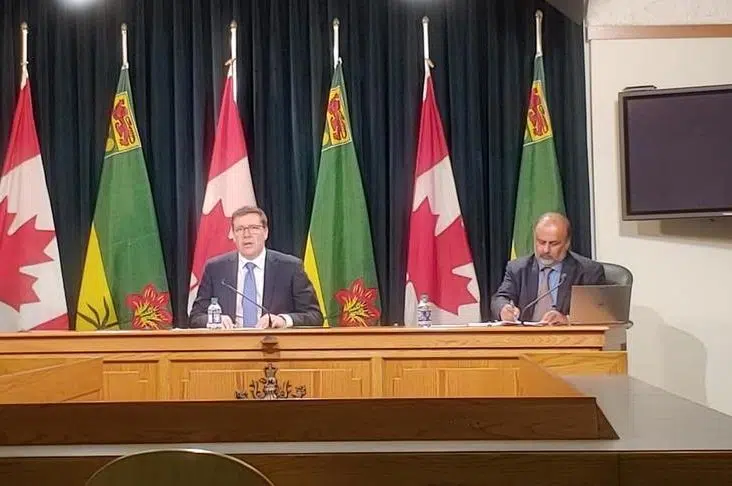Less than a week into the first phase of the Re-Open Saskatchewan plan, and with a week and a half to go until the second phase starts, the province is releasing another set of changes to the plan.
The update includes clarifications on things like the proper use of personal protective equipment, new guidelines for things like drive-in theatres and farmers’ markets, and more guidelines for things like thrift stores and golf courses.
Premier Scott Moe explained the changes stem from suggestions made to the government by businesses and industry. He said many have been calling the business response telephone line.
“In many cases, providing suggestions as to how they can operate better, not only from their perspective, but in a safer manner, in offering the business services, or offering recreation service, or in many cases religious services safely to people in our community,” said Moe.
Moe said the suggestions then to go to Public Health and are considered as to whether the suggestions can be implemented safely.
Dr. Saqib Shahab, the province’s chief medical health officer, said Public Health gives their best recommendations based on science, but the leaders on implementation are business owners.
“Because they know their business and many have already started thinking about: ‘okay, given my floor plan and how customers come, what’s the best way I can maintain physical distancing and keep my customers safe as well as myself and my employees safe,” said Shahab.
Moe gave driving ranges now being able to open as an example.
“If the industry, the golf courses, have come up with a solution as to how to offer that service but ensure that it’s offered safely from a public health perspective. We most certainly have no reason to not allow those individuals to experience that.”
Moe said, along with business owners, the province is getting suggestions from people who use the businesses.
“They’ve come forward with what I would say are very innovative solutions that are quite realistic from those that are offering or utilizing the service. And, quite frankly, it just may not have been things that we have had time to think about as we’ve gone through the initial framework of Re-Open Saskatchewan,” said Moe.
According to Moe this isn’t loosening restrictions; he calls it being able to provide all the services and opportunities to people. Moe said the province will continue to work with people and businesses on updating and expanding the plan.
The numbers
The Government of Saskatchewan reported 13 new cases of COVID-19 and six more recoveries Friday.
The number of people hospitalized jumped to 19. There were 12 people in hospital as of Thursday.
The 13 new cases increase the provincial total so far to 544.
Twelve of the new cases are in the far north, all in the La Loche area. The other new case is in the north region.
The six recoveries increase the provincial total to 335.
Of the total number of cases, 203 are considered active. That comprises 148 cases in the far north, 38 in the north, 15 in Saskatoon and two in Regina. Neither the central region of the province nor the south has an active case.
There are 15 people (nine in Saskatoon and six in the north) who are receiving inpatient care. Three people are in intensive care in Saskatoon and one is in an ICU in the north.
Of the total number of cases, 179 have been in the far north, 163 have been in the Saskatoon area, 100 have been in the north, 76 have been in the Regina area, 15 were in the south, and 11 have been from the central region.
The total number of cases includes 44 health-care workers.
In terms of age, 192 cases are in the 20-to-39 range, 171 are between the ages of 40 and 59, 93 are in the 60-to-79 range, 72 involve people 19 years of age and under, and 16 are in the 80-and-over range.
Nearly half of all cases — 260 of the 544 — are community contacts.
There were 815 tests done Thursday, increasing the province’s total to date to 35,176.
Outbreak at P.A. hospital over
The Saskatchewan Health Authority (SHA) says a COVID-19 outbreak at Prince Albert’s Victoria Hospital is over.
In a media release Friday, the SHA said medical health officer Dr. Khami Chokani declared the end of the outbreak “after not a single case was discovered either in patients or (health-care workers).”
The outbreak was declared May 1 because of the length of time a COVID-positive patient had stayed at the hospital without anyone knowing of their condition.
The SHA said the patient initially was admitted to the hospital on April 21 for a non-COVID-19-related medical need. The patient had tested negative for the virus before arriving at the hospital, but then tested positive on April 30.
Staff who were in close contact with the patient had to self-isolate and were tested and contact tracing was started. There weren’t any positive tests among the health-care workers or other contacts.
The government explained that the declaration of an outbreak – even when there’s only one case – is used to co-ordinate a response to the virus. That term isn’t an indicator of risk to the public.
The province noted that an outbreak can be declared in long-term care and personal care homes when one person (a resident or health care worker) tests positive for COVID-19.
Outbreaks will be posted if there’s a positive case in hospitals, long-term care homes, assisted living facilities with a long-term care unit, personal care homes, homeless shelters and correctional facilities.
Notifications will also be given in the absence of an outbreak being declared when there is a risk of transmission to the public.
Mother’s Day
With Mother’s Day set for Sunday, the government and SHA have updated the rules for gifts that can be sent to those in long-term care facilities.
Flowers from a florist and dry paper gifts have been approved. As a result, purchased floral arrangements and things such as cards, letters, books, photos and artwork will be allowed.
Floral arrangements aren’t permitted in some acute care settings — such as intensive care units – because of possible allergies.
Lieutenant governor sends best wishes
In an open letter released Friday, Lt. Gov. Russ Mirasty — who was born and raised in La Ronge — offered his best wishes to Saskatchewan’s northern communities as they deal with COVID-19.
“Donna and I extend our sincere condolences to the families who recently lost elders to the virus,” Mirasty said. “We appreciate the role that elders have within our families and communities, and their passing is heartbreaking.”
He thanked the health-care workers, police officers, paramedics, community leaders and volunteers who have helped Saskatchewan residents battle the coronavirus.
“All of these people that I’ve mentioned are doing the best they can, and to make their job a little easier, we all need to do our part by staying home and keeping our families and communities safe,” Mirasty wrote.
“Donna and I look forward to when we can travel and visit northern communities again.”







